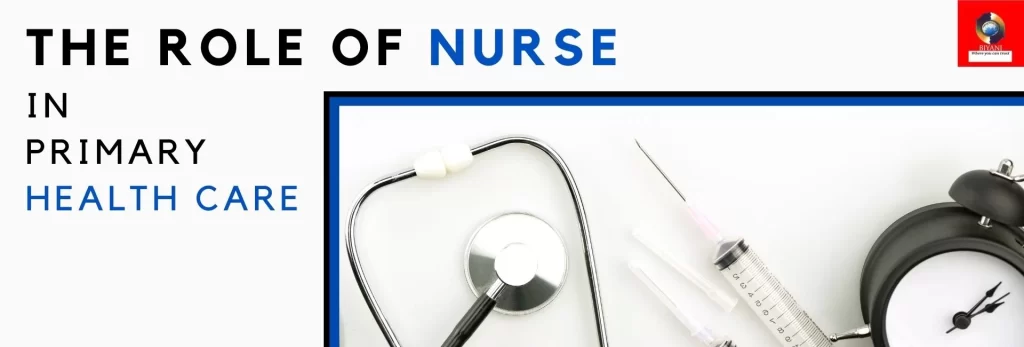Introduction
Hey there, I hope you’re doing good. This blog is all about the Role of Nurse in Primary Health Care as is the first level of contact from which interaction among individuals, family, and health services begin. Firstly, you’re gonna read about the definition and elements of Primary health care. Afterward, we’ll move to the principles of Primary health care. Keep reading till the end of the blog as you’ll get the Role of Nurse in Primary Health Care at the end of this blog.
Definition
Primary Health Care is essential health care meet universally accessible to individuals and acceptable to them, through their full participation and at a cost the community and country can afford.
Elements – There are the eight important components of primary health care
- Health Education – Educating the people about prevalent health problems their control and the methods of prevention.
- Nutrition – Encouraging suitable nutrition and the food supply.
- Water and sanitation – Supply safe drinking water and maintenance of essential sanitation facilities.
- Maternal and child health – In addition to taking care of mother and child health, it also includes family services.
- Immunization – Protection from major infectious disease.
- Prevention of Endemic disease – Control and prevention of endemic disease.
- Treatment – Treatment of general disease and injuries.
- Drug Availability – Ensuring easy availability of drugs.

Principles of Primary Health Care –
World Health Organization has given the following five principles of primary health care:
- Equitable Distribution – It means the primary health services and resources should be equally distributed without any discrimination of color, caste, sex, area, religion, money, etc.
- Community Participation – It means the active participation of individuals, families, and communities is necessary. It isn’t easy to achieve the goals of primary health care if the support of the local community is not available.
- Appropriate Technology – In primary health care only those techniques should be used which are suitable to local requirements socially acceptable, within the financial limits, and scientifically recognized.
- Focus on Prevention – The main focus of primary health is not only the treatment but also the prevention of disease and it is a part of all the constituents of health services. Health education is also stressed by primary health care.
- Multi-sectorial Coordination – Only the medical field cannot replace all the constituents of primary health care therefore, proper coordination should be planned among the medical field, agriculture, housing, nutrition, public work, communication, education, etc. Providing primary health care requires the joint effort of all these fields.
The Role of Nurse in Primary Health Care:
(A) Care Provider – The nurse also provides skilled care in clinics and at door step during home visits. She provides required care according to the needs of the people.
(B) Collaborator – The PHC nurse works collaboratively with the health team members in providing health care services.
(C) Sensitive Observer – Primary health care nurse is an alert and active observer. She is supposed to be aware of her surrounding environment changes and natural disasters.
(D) Concerned Adviser – The PHC nurse advises people of the community, on how to handle problematic situations.
(E) Manager – A PHC nurse or CHN (Community Health Nursing) organizes and manages various health plans or programs and also does monitoring of health activities.
(F) Motivator – A PHC nurse motivates people in the community in maintaining their health.
(G) Leadership – In the absence of a medical officer, the community health nurse is the leader of the health team at the primary health center.
(H) Education – PHC nurse promotes the health of the community through health education. She teaches the importance of breastfeeding, nutrition, weaning, and family welfare services.
Blog By:-
Mr. Rakesh Kumar Sharma
Biyani Group of Colleges, Jaipur
CLICK HERE
to pursue your Graduation by sitting at your home.

